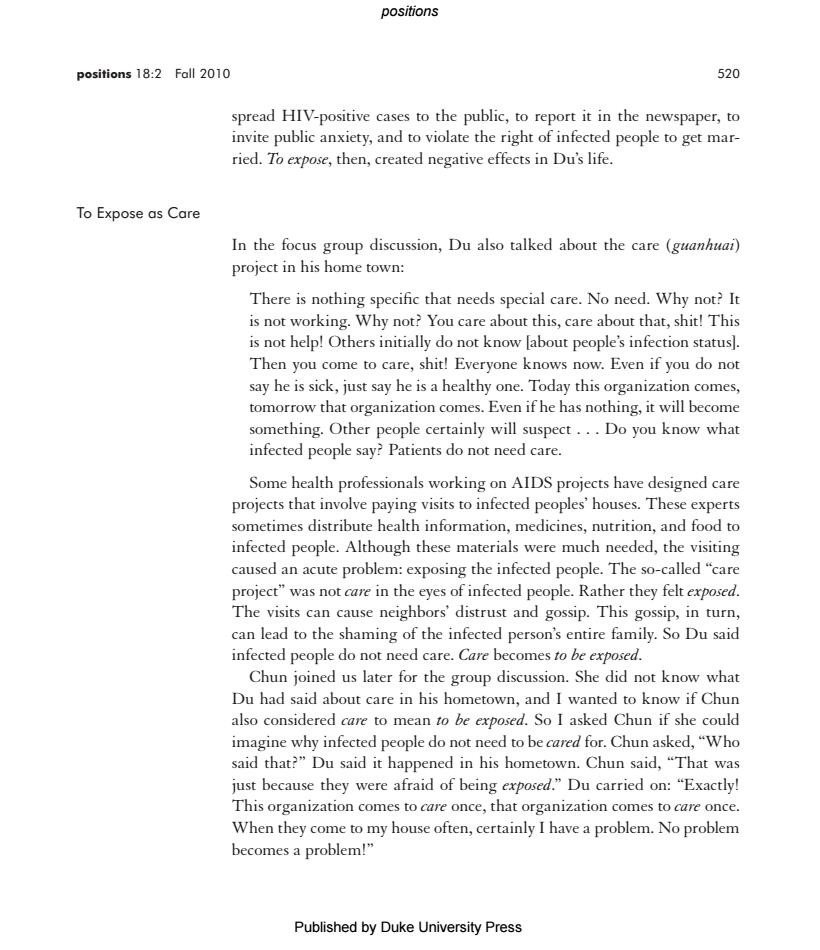正在加载图片...

positions positions 18:2 Fall 2010 520 spread HIV-positive cases to the public,to report it in the newspaper,to invite public anxiety,and to violate the right of infected people to get mar- ried.To expose,then,created negative effects in Du's life. To Expose as Care In the focus group discussion,Du also talked about the care (guanhuai) project in his home town: There is nothing specific that needs special care.No need.Why not?It is not working.Why not?You care about this,care about that,shit!This is not help!Others initially do not know [about people's infection statusl. Then you come to care,shit!Everyone knows now.Even if you do not say he is sick,just say he is a healthy one.Today this organization comes, tomorrow that organization comes.Even if he has nothing,it will become something.Other people certainly will suspect...Do you know what infected people say?Patients do not need care. Some health professionals working on AIDS projects have designed care projects that involve paying visits to infected peoples'houses.These experts sometimes distribute health information,medicines,nutrition,and food to infected people.Although these materials were much needed,the visiting caused an acute problem:exposing the infected people.The so-called"care project"was not care in the eyes of infected people.Rather they felt exposed. The visits can cause neighbors'distrust and gossip.This gossip,in turn, can lead to the shaming of the infected person's entire family.So Du said infected people do not need care.Care becomes to be exposed. Chun joined us later for the group discussion.She did not know what Du had said about care in his hometown,and I wanted to know if Chun also considered care to mean to be exposed.So I asked Chun if she could imagine why infected people do not need to be cared for.Chun asked,"Who said that?"Du said it happened in his hometown.Chun said,"That was just because they were afraid of being exposed."Du carried on:"Exactly! This organization comes to care once,that organization comes to care once. When they come to my house often,certainly I have a problem.No problem becomes a problem!”' Published by Duke University Presspositions 18:2 Fall 2010 520 spread HIV-positive cases to the public, to report it in the newspaper, to invite public anxiety, and to violate the right of infected people to get married. To expose, then, created negative effects in Du’s life. To Expose as Care In the focus group discussion, Du also talked about the care ( guanhuai) project in his home town: There is nothing specific that needs special care. No need. Why not? It is not working. Why not? You care about this, care about that, shit! This is not help! Others initially do not know [about people’s infection status]. Then you come to care, shit! Everyone knows now. Even if you do not say he is sick, just say he is a healthy one. Today this organization comes, tomorrow that organization comes. Even if he has nothing, it will become something. Other people certainly will suspect . . . Do you know what infected people say? Patients do not need care. Some health professionals working on AIDS projects have designed care projects that involve paying visits to infected peoples’ houses. These experts sometimes distribute health information, medicines, nutrition, and food to infected people. Although these materials were much needed, the visiting caused an acute problem: exposing the infected people. The so-called “care project” was not care in the eyes of infected people. Rather they felt exposed. The visits can cause neighbors’ distrust and gossip. This gossip, in turn, can lead to the shaming of the infected person’s entire family. So Du said infected people do not need care. Care becomes to be exposed. Chun joined us later for the group discussion. She did not know what Du had said about care in his hometown, and I wanted to know if Chun also considered care to mean to be exposed. So I asked Chun if she could imagine why infected people do not need to be cared for. Chun asked, “Who said that?” Du said it happened in his hometown. Chun said, “That was just because they were afraid of being exposed.” Du carried on: “Exactly! This organization comes to care once, that organization comes to care once. When they come to my house often, certainly I have a problem. No problem becomes a problem!” positions Published by Duke University Press